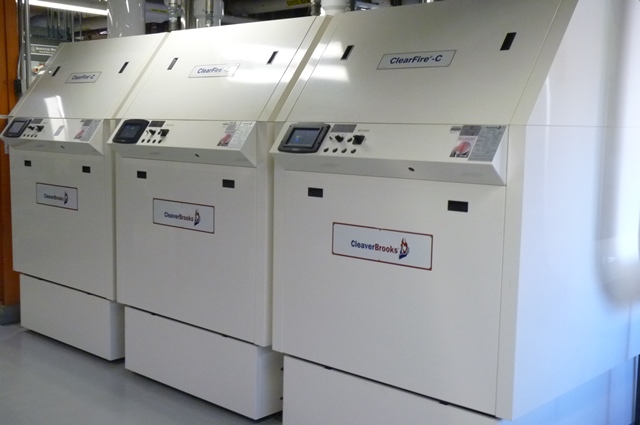By Kori Jones
Delta Hospital is a Fraser Health community based hospital located in the lower mainland of British Columbia. This facility supports 150 beds and provides a combination of acute and extended care services to the surrounding communities.
In the spring of 2014, Delta Hospital’s Facilities Maintenance & Operations (FMO) team were investigating options to upgrade the existing aged and inefficient heating plant. What started as a necessary upgrade, resulted in a collaborative project management opportunity, as the Energy and Environmental Sustainability (EES) team were in the process of identifying cost effective emission reduction projects to apply for Carbon Neutral Capital Program (CNCP) provincial funding.
“Building relationships with the FMO teams across Fraser Health is inherent to the success of many of our projects. On sites with established strong relationships and open communication, we have been rewarded with a better understanding of facility needs, and greater opportunity to identify and implement projects that enhance operations and improve health care facilities,” says Robert Bradley, Energy Manager for Fraser Health.
The FMO and EES teams allocated resources and coordinated responsibilities in a team focused approach. A dedicated FMO Project Leader managed the site coordination along with the direct support of the Delta Hospital FMO team. The EES team managed the project finances, provided technical and project management support, and successfully secured a significant CNCP grant for the project. The EES team also partnered with the regional electricity and natural gas utilities to capture financial incentives to support the energy saving measures of this project. Stage 3 Renewables was engaged as the mechanical engineering consultant and the prime contractor role was awarded to Innovative Mechanical.
The project team, with guidance from the engineering consultant, worked closely to design a high efficiency condensing boiler plant with a consolidated hot water storage system. The final design required detailed system engineering to address the site specific challenges of replacing a completely new heating plant into an existing facility. An innovative re-piping strategy was developed to ensure that the boilers dual return water inlets had an average water temperature of less than 55° C. This low return water temperature, which allowed the boilers to condense and operate at an optimal efficiency, was possible through the integration of double coil heat recovery hot water tanks, variable speed re-circulation pumps, heating coil energy valves and variable frequency drives on the hot water supply pumps.
Project success was monitored after a year of collecting trend data from the site Energy Management Information System (EMIS) and the Building Management System. The trends confirmed a six percent electrical saving and an 11 percent natural gas saving; compared to the weather adjusted pre-project energy consumption baseline. The estimated annual energy and maintenance savings from this project are $25,000 and reduction of over 80 tCO2e greenhouse gas emissions.
The success of this project was largely due to the active participation of the FMO team and clear communication throughout this project – the team operating the new plant was involved at every project stage. This holistic view was built into the project goals listed below:
- To provide Delta Hospital with a reliable and highly efficient modern heating plant upgrade that is delivered on schedule and budget.
- To integrate the FMO team in the project design and implementation to develop system knowledge and provide a comprehensive project hand over.
- To improve patient comfort while reducing the energy consumption, environmental impact and heating plant maintenance requirements.
Dave Simmons, the FMO Project Leader, notes that “Involving the FMO team early in the system design and throughout the project delivery allowed direct input from the people who will be operating this system after the project is considered complete. This approach also streamlined the decision making process and identified design risks early on which saved time and reduced project costs when compared to traditional project delivery methods”.
The FMO and EES teams continue to meet quarterly, as part of a regional FMO Engagement program, to review the energy performance data from the EMIS, identify further energy saving opportunities, and build awareness of the site challenges. An expanded building automation system, which has improved control and trending capabilities, and the implementation of a successful pilot of an Automatic Fault Diagnostic Detection system are the result of this ongoing team work.
This collaborative project implementation approach has been so successful that it has since been emulated at other Fraser Health sites. A high efficiency boiler plant upgrade and ventilation optimization project was completed at Mission Memorial Hospital and Ridge Meadows Hospital in 2017.
Kori Jones is the Energy Manager at Vancouver Coastal Health.


